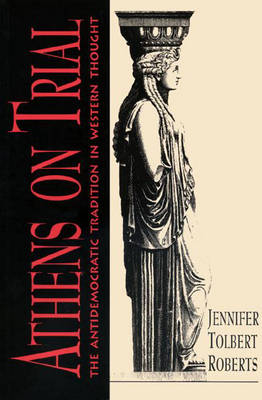
Athens on Trial
The Antidemocratic Tradition in Western Thought
Seiten
1994
Princeton University Press (Verlag)
978-0-691-05697-5 (ISBN)
Princeton University Press (Verlag)
978-0-691-05697-5 (ISBN)
- Titel ist leider vergriffen;
keine Neuauflage - Artikel merken
Whether praising Athens's government as the legitimate ancestor of modern democracy or condemning it as mob rule, commentators throughout history have revealed much about their own notions of politics and society. This study charts responses to Athenian democracy from ancient times to today.
The classical Athenians were the first to articulate and implement the notion that ordinary citizens of no particular affluence or education could make responsible political decisions. For this reason, reactions to Athenian democracy have long provided a prime testing ground for political thought. Whether praising Athens's government as the legitimate ancestor of modern democracies or condemning it as mob rule, commentators throughout history have revealed much about their own notions of politics and society. This study charts responses to Athenian democracy from the ancient world to the 20th century, exploring a debate that touches upon historiography, ethics, political science, anthropology, sociology, philosophy, gender studies and educational theory. Rooted in the bias of Greek intellectuals, the text argues, hostility to Athenian democracy gained strength from the propensity of Western thinkers to read history backward and infer the impotence of Athens's form of government from the Athenians' ultimate defeat by Macedon in 338 BC.
In time, dislike of Athenian government developed into a powerful intellectual construct that stood largely unchallenged until the early 19th century. In the epilogue, the author examines the controversies that continue to surround Athens in the present day.
The classical Athenians were the first to articulate and implement the notion that ordinary citizens of no particular affluence or education could make responsible political decisions. For this reason, reactions to Athenian democracy have long provided a prime testing ground for political thought. Whether praising Athens's government as the legitimate ancestor of modern democracies or condemning it as mob rule, commentators throughout history have revealed much about their own notions of politics and society. This study charts responses to Athenian democracy from the ancient world to the 20th century, exploring a debate that touches upon historiography, ethics, political science, anthropology, sociology, philosophy, gender studies and educational theory. Rooted in the bias of Greek intellectuals, the text argues, hostility to Athenian democracy gained strength from the propensity of Western thinkers to read history backward and infer the impotence of Athens's form of government from the Athenians' ultimate defeat by Macedon in 338 BC.
In time, dislike of Athenian government developed into a powerful intellectual construct that stood largely unchallenged until the early 19th century. In the epilogue, the author examines the controversies that continue to surround Athens in the present day.
Jennifer Tolbert Roberts is Professor of History at Southern Methodist University and Associate Professor of Classical Languages and History at the City College of New York and the CUNY Graduate Center. She is the author of Accountability in Athenian Government (Wisconsin) and, with Robert Zaller and Richard Greaves, Civilizations of the West (HarperCollins).
| Verlagsort | New Jersey |
|---|---|
| Sprache | englisch |
| Maße | 197 x 254 mm |
| Gewicht | 794 g |
| Themenwelt | Geisteswissenschaften |
| Sozialwissenschaften ► Politik / Verwaltung ► Politische Systeme | |
| ISBN-10 | 0-691-05697-8 / 0691056978 |
| ISBN-13 | 978-0-691-05697-5 / 9780691056975 |
| Zustand | Neuware |
| Haben Sie eine Frage zum Produkt? |
Mehr entdecken
aus dem Bereich
aus dem Bereich
über Alltagsorte des sozialen Zusammenhalts
Buch | Softcover (2024)
transcript (Verlag)
CHF 33,55


